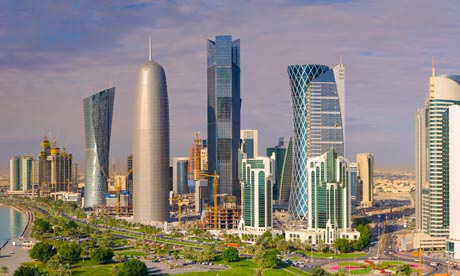Since Independence.
 One of the great keys to Qatari success has been its oil and natural gas production. Experts estimate that the state possesses more than fifteen percent of the world’s proven gas reserves. Because of the petroleum industry, Qatar is one of the wealthiest countries in the world as evidenced by the impressive construction in Doha over the past decade.
One of the great keys to Qatari success has been its oil and natural gas production. Experts estimate that the state possesses more than fifteen percent of the world’s proven gas reserves. Because of the petroleum industry, Qatar is one of the wealthiest countries in the world as evidenced by the impressive construction in Doha over the past decade. The immense wealth balances well with the small population. Just over two million people call Qatar home (permanently or temporarily). Resident foreigners vastly outnumber the Qatari citizenry. Indians and Pakistanis, for instance, constitute the largest ethnic groups with a combined 900,000 residents, while there are only 278,000 Qatari citizens.
The immense wealth balances well with the small population. Just over two million people call Qatar home (permanently or temporarily). Resident foreigners vastly outnumber the Qatari citizenry. Indians and Pakistanis, for instance, constitute the largest ethnic groups with a combined 900,000 residents, while there are only 278,000 Qatari citizens.
The fantastic wealth of Qatar has lead to the erasure of basically all taxes for both citizens and residents, and an all-embracing welfare state for the Qatari people. Even for foreign residents, many services are free or heavily subsidized.
Qatar has also undergone a great deal of political and social change since its inception in 1971. A year after independence, conflict within the ruling al-Thani family resulted in palace coup by which Khalifa bin Hamad al-Thani took power.
 |
| Hamad bin Khalifa al-Thani and his wife, Sheikha Moza |
The monarchy initiated a program of modernization and modest liberalization after a bloodless second coup in 1995 gained power for Hamad bin Khalifa. That included the establishment, in 1996, of the Al-Jazeera Network through which Qatar is gaining regional influence. As a degree of press freedom has been instituted, the Doha-based satellite television station has attracted a growing audience and become one of the most important broadcasters in the Arab world.
And testament to the growing influence of the English language in the region, Al-Jazeera launched exclusively English programming in 2006. Legislation approved in 2012, however, maintains certain regulations on what can and cannot be broadcast in media.
Qatar also has the highest level of internet usage in the Middle East, though some material remains filtered.
Additionally, as part of the liberalization efforts, in 1999 Qatar held elections for a municipal council. Women were permitted to both vote and run for office. In 2003, the government established a new constitution (that took effect in 2005) which created a parliament – the Advisory Council – with thirty elected and fifteen appointed members.
 |
| Sheikh Tamim (left) and the former emir, Hamad (right) |
2003 also saw the beginning of a transition in leadership. That year, Sheikh Hamad announced the preference of one of his younger sons, Prince Tamim, for succession. In 2013, Hamad abdicated and peacefully transferred power – a unique move in the Middle East. Sheikh Tamim had been involved in running the country under his father's direction in previous years, and so many commentators do not anticipate any major changes to foreign or domestic policies of the previous two decades.
The tiny emirate also aims to be a major political player in the region. The Qataris have maintained good relations with the United States for several decades. After Iraq invaded Kuwait in 1990, Qatar allowed American forces on its soil. Qatari troops also took part in the liberation of Kuwait. In 2011, the Qatari helped arm the Libyan opposition and joined international military operations against Muammar Qaddafi.
 They have also been active on the diplomatic stage, mediating disputes in the Middle East and Africa. And in 2012, the Afghan opposition was permitted to set up offices in Doha to facilitate peace talks with the American Government.
They have also been active on the diplomatic stage, mediating disputes in the Middle East and Africa. And in 2012, the Afghan opposition was permitted to set up offices in Doha to facilitate peace talks with the American Government.
With so much still in progress, it will be fascinating to watch as Qatar expands its role in the world.

No comments:
Post a Comment